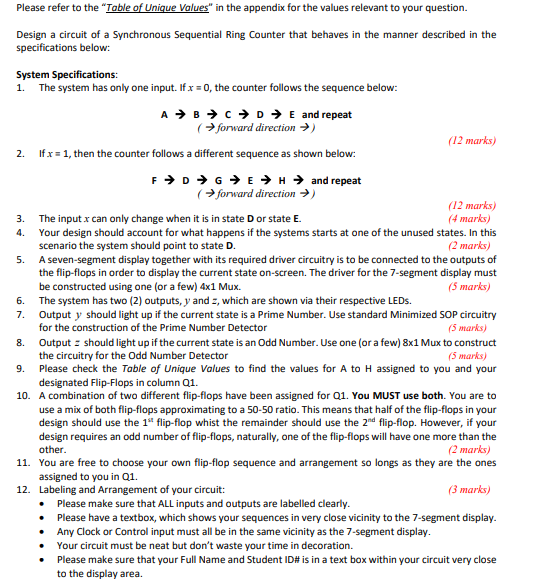Answered step by step
Verified Expert Solution
Question
1 Approved Answer
Unique Values: A - 3, B - 5, C - 4, D - 1, E - 6, F - 7, G - 0, H -

Unique Values: A - 3, B - 5, C - 4, D - 1, E - 6, F - 7, G - 0, H - 2
Use flip-flops D & SR
2. 3. 4. 5. Please refer to the Table of Unique Values" in the appendix for the values relevant to your question. Design a circuit of a Synchronous Sequential Ring Counter that behaves in the manner described in the specifications below: System Specifications: 1. The system has only one input. If x = 0, the counter follows the sequence below: A B C D E and repeat ( forward direction) (12 marks) If x = 1, then the counter follows a different sequence as shown below: FD E H and repeat ( forward direction) (12 marks) The input x can only change when it is in state Dor state E. (4 marks) Your design should account for what happens if the systems starts at one of the unused states. In this scenario the system should point to state D. (2 marks) A seven-segment display together with its required driver circuitry is to be connected to the outputs of the flip-flops in order to display the current state on-screen. The driver for the 7-segment display must be constructed using one (or a few) 4x1 Mux. (5 marks) The system has two (2) Outputs, y and s, which are shown via their respective LEDs. 7. Output y should light up if the current state is a Prime Number. Use standard Minimized SOP circuitry for the construction of the Prime Number Detector (5 marks) 8. Output = should light up if the current state is an Odd Number. Use one for a few) 8x1 Mux to construct the circuitry for the Odd Number Detector (5 marks) 9. Please check the Table of Unique Values to find the values for A to H assigned to you and your designated Flip-Flops in column 21. 10. A combination of two different flip-flops have been assigned for 01. You MUST use both. You are to use a mix of both flip-flops approximating to a 50-50 ratio. This means that half of the flip-flops in your design should use the 1st flip-flop whist the remainder should use the 2nd flip-flop. However, if your design requires an odd number of flip-flops, naturally, one of the flip-flops will have one more than the other. (2 marks) 11. You are free to choose your own flip-flop sequence and arrangement so long as they are the ones assigned to you in 01. 12. Labeling and Arrangement of your circuit: (3 marks) Please make sure that ALL inputs and outputs are labelled clearly. Please have a textbox, which shows your sequences in very close vicinity to the 7-segment display. Any Clock or Control input must all be in the same vicinity as the 7-segment display. Your circuit must be neat but don't waste your time in decoration. Please make sure that your Full Name and Student ID# is in a text box within your circuit very close to the display area. 6. 8. 2. 3. 4. 5. Please refer to the Table of Unique Values" in the appendix for the values relevant to your question. Design a circuit of a Synchronous Sequential Ring Counter that behaves in the manner described in the specifications below: System Specifications: 1. The system has only one input. If x = 0, the counter follows the sequence below: A B C D E and repeat ( forward direction) (12 marks) If x = 1, then the counter follows a different sequence as shown below: FD E H and repeat ( forward direction) (12 marks) The input x can only change when it is in state Dor state E. (4 marks) Your design should account for what happens if the systems starts at one of the unused states. In this scenario the system should point to state D. (2 marks) A seven-segment display together with its required driver circuitry is to be connected to the outputs of the flip-flops in order to display the current state on-screen. The driver for the 7-segment display must be constructed using one (or a few) 4x1 Mux. (5 marks) The system has two (2) Outputs, y and s, which are shown via their respective LEDs. 7. Output y should light up if the current state is a Prime Number. Use standard Minimized SOP circuitry for the construction of the Prime Number Detector (5 marks) 8. Output = should light up if the current state is an Odd Number. Use one for a few) 8x1 Mux to construct the circuitry for the Odd Number Detector (5 marks) 9. Please check the Table of Unique Values to find the values for A to H assigned to you and your designated Flip-Flops in column 21. 10. A combination of two different flip-flops have been assigned for 01. You MUST use both. You are to use a mix of both flip-flops approximating to a 50-50 ratio. This means that half of the flip-flops in your design should use the 1st flip-flop whist the remainder should use the 2nd flip-flop. However, if your design requires an odd number of flip-flops, naturally, one of the flip-flops will have one more than the other. (2 marks) 11. You are free to choose your own flip-flop sequence and arrangement so long as they are the ones assigned to you in 01. 12. Labeling and Arrangement of your circuit: (3 marks) Please make sure that ALL inputs and outputs are labelled clearly. Please have a textbox, which shows your sequences in very close vicinity to the 7-segment display. Any Clock or Control input must all be in the same vicinity as the 7-segment display. Your circuit must be neat but don't waste your time in decoration. Please make sure that your Full Name and Student ID# is in a text box within your circuit very close to the display area. 6. 8Step by Step Solution
There are 3 Steps involved in it
Step: 1

Get Instant Access to Expert-Tailored Solutions
See step-by-step solutions with expert insights and AI powered tools for academic success
Step: 2

Step: 3

Ace Your Homework with AI
Get the answers you need in no time with our AI-driven, step-by-step assistance
Get Started


